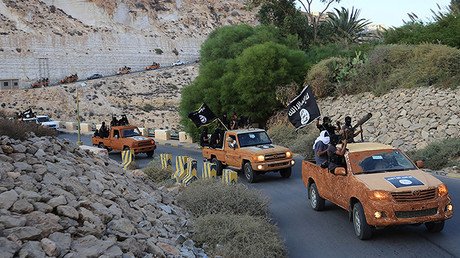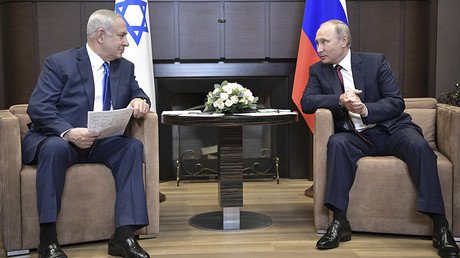Hezbollah co-leader: US nurtured ISIS monster against Syrian govt, now has to fight them
The US had to step back from its policy of regime change in Syria after multiple failures, as the jihadists they allegedly hoped to use as a proxy began posing a threat, Hezbollah’s Deputy Secretary General, Sheikh Naim Qassem argued in an interview to RT.
For an exclusive interview with RT’s Eisa Ali, one of the most senior Hezbollah leaders agreed to meet –with the toughest security precautions in place – in a clandestine location in Beirut. Qassem told RT he believes US President Donald Trump has opted for a less confrontational approach in Syria of late after previous attempts to oust the Syrian government proved futile.
“When they failed by using the military option, or by using the opposition option, or by using their cooperation with the regional Arabic countries that wanted change in Syria in favor of Israel, America adopted a new non-confrontation policy with President [Bashar] Assad because of their inability to do more, and because they know that [Islamic State] is against them as much as they are against the Syrian people,” Kassem claimed.
READ MORE: No role for West & allies in Syria until they cut support to terrorists – Assad
He noted, however, that a perceived change in political strategy does not mean that the White House has reversed its opinion of Assad, arguing that the US has been left with no better option than to fight the “monster” of Islamic State (IS, formerly ISIS/ISIL) which they helped to create in the first place but which has “now shifted against them.”
‘We’ll respect any choice made by the Syrian people’
Speaking of Syrian President Bashar Assad, and Hezbollah’s view on his role as the country’s head of state, Qassem said that the group regards Assad as the legitimate ruler of Syria, re-elected by the people to serve as the country’s leader.
Arguing that the main interest of the US in the war was to “remove President Assad from power and change Syria's stance from resistance to American-Israeli friendly,” he praised Assad for being an effective leader, guiding his country through difficult times of war.
However, he went on to stress that the Syrian President’s fate lies exclusively in the hands of the Syrian people.
“We are with the Syrian people’s choice and when it is election time and Syria’s choice will be made without external intervention, we will respect any choice made by the Syrian people.”
Qassem said there is an “effective” cooperation between the Syrian and Russian armed forces, Iran and Hezbollah, which has contributed greatly to Syria’s driving jihadists out of swathes of its territory.
‘Israel plays part in Syria’s destruction’
Accusing Israel of fuelling the protracted Syrian conflict, Qassem in particular pointed to the Jewish state’s reported support of armed opposition groups fighting the Syrian forces and affiliated militias in the south-western Syrian city of Daraa and the Israeli-occupied Golan Heights.
“Israel plays the main part in Syria’s destruction, and it is an important supporter of the armed opposition, especially in the southern part of Syria,” Kassem said.
Qassem further claimed that over 3000 militants fighting the Syrian government have received treatment in Israeli hospitals, adding that there have been reports of cross-border supplies of munitions and food from Israel to Syria.
A US-Russian ceasefire agreement for south-western Syria dealt a blow to Israel’s alleged aspirations as it did not include removing Hezbollah from its positions in the border area, Qassem argued. Shortly after the deal was agreed in July, Israel’s Prime Minister Benjamin Netanyahu denounced the plan, saying it might strengthen Iranian influence in the country.
Criticism was levelled at Hezbollah in late August for allowing the evacuation of some 300 Islamic State terrorists and roughly as many family members from the Qalamoun Mountains to the eastern province of Deir al-Zor as part of the deal to return bodies of eight slain Lebanese army soldiers. Qassem justified the controversial move by saying that the group did not know whether the soldiers were alive or dead and that it was “an important chance that could not be [used] again.”
READ MORE: ‘Lines agreed to’ with Russia for final push against ISIS in Syria – US general
The deal sparked outrage, with critics slamming the group for negotiating with terrorists. After the deal was struck and the militants departed to Deir ez-Zor, the US-led international coalition shelled the road to impede relocations of militants and their family members and struck some of the vehicles and fighters it “clearly identified as ISIS.” In a statement following the attack, the coalition said it “was not a party to any agreement” negotiated between Lebanon, ISIS and Hezbollah and considered the moving of terrorists from one part of the country to another “not a lasting solution.”
Since the beginning of the Syrian conflict six years ago, Hezbollah has been embroiled in fighting IS and Al-Nusra Front terrorists in Syria in cooperation with government forces. The group, which is listed as a terrorist entity in the West and in most of the Arab League countries, has been repeatedly targeted by Israeli airstrikes on Syrian soil.
WATCH FULL INTERVIEW














